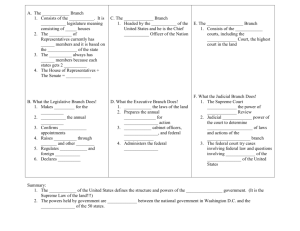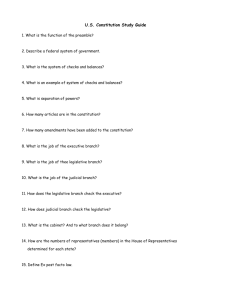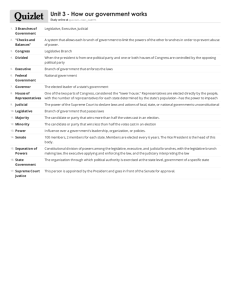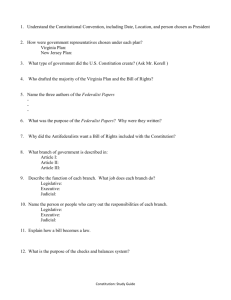8th Grade Chapter 8 Test DIRECTIONS: Use the following words to
advertisement
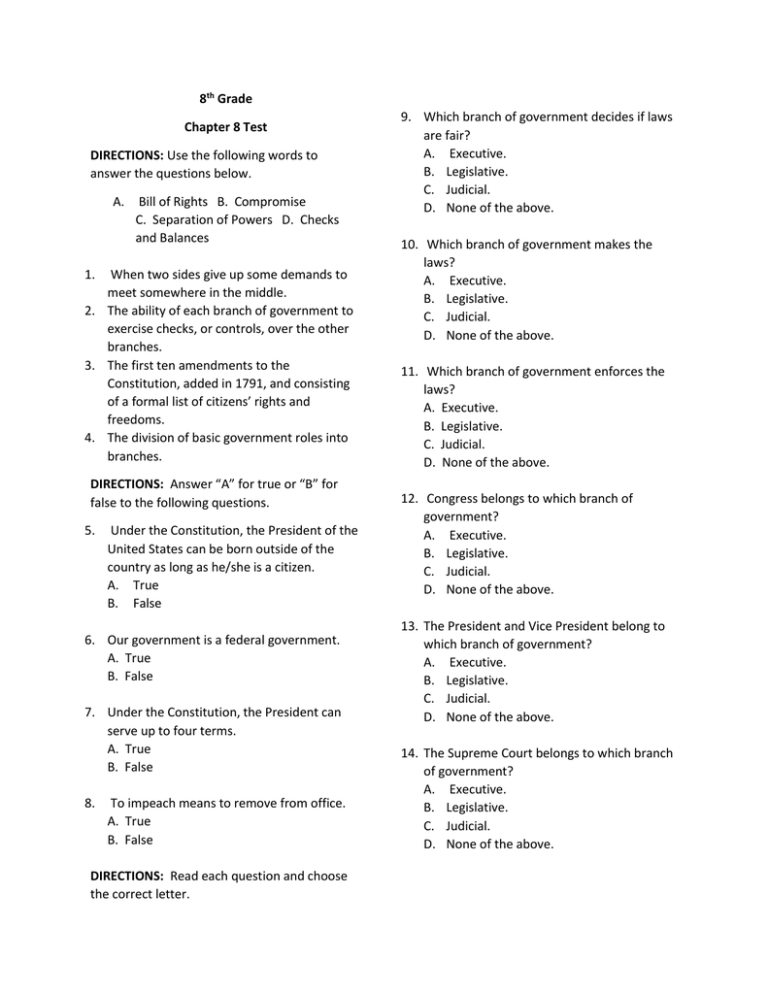
8th Grade Chapter 8 Test DIRECTIONS: Use the following words to answer the questions below. A. Bill of Rights B. Compromise C. Separation of Powers D. Checks and Balances 1. When two sides give up some demands to meet somewhere in the middle. 2. The ability of each branch of government to exercise checks, or controls, over the other branches. 3. The first ten amendments to the Constitution, added in 1791, and consisting of a formal list of citizens’ rights and freedoms. 4. The division of basic government roles into branches. DIRECTIONS: Answer “A” for true or “B” for false to the following questions. 5. Under the Constitution, the President of the United States can be born outside of the country as long as he/she is a citizen. A. True B. False 6. Our government is a federal government. A. True B. False 7. Under the Constitution, the President can serve up to four terms. A. True B. False 8. To impeach means to remove from office. A. True B. False DIRECTIONS: Read each question and choose the correct letter. 9. Which branch of government decides if laws are fair? A. Executive. B. Legislative. C. Judicial. D. None of the above. 10. Which branch of government makes the laws? A. Executive. B. Legislative. C. Judicial. D. None of the above. 11. Which branch of government enforces the laws? A. Executive. B. Legislative. C. Judicial. D. None of the above. 12. Congress belongs to which branch of government? A. Executive. B. Legislative. C. Judicial. D. None of the above. 13. The President and Vice President belong to which branch of government? A. Executive. B. Legislative. C. Judicial. D. None of the above. 14. The Supreme Court belongs to which branch of government? A. Executive. B. Legislative. C. Judicial. D. None of the above. 15. How long is a Supreme Court Justice’s term of office? A. 2 years. B. 4 years. C. 6 years. D. Life. 21. Who is the head of the House of Representatives? A. The President. B. The Vice President. C. The Speaker of the House. D. The Chief Justice. 16. How long is a Senator’s term of office? A. 2 years. B. 4 years. C. 6 years. D. For life. 22. Under the Constitution, who is the third in command? A. The President. B. The Vice President. C. The Speaker of the House. D. The Chief Justice. 17. How long is a Representative’s term of office? A. 2 years. B. 4 years. C. 6 years. D. For life. 23. How does Congress amend the Constitution? A. With a unanimous vote of both houses. B. With a veto by the President. C. With a 2/3 majority vote of both houses. D. All of the above. 18. How long is the President’s term of office? A. 2 years. B. 4 years. C. 6 years. D. For life. 24. How many senators does each state get? A. 50. B. 100. C. It’s based on population. D. None of the above. 19. How many Supreme Court Justices currently sit on the Supreme Court? A. Nine. B. Twelve. C. Fifty. D. One hundred. 25. How many representatives does each state get? A. 50. B. 100. C. It’s based on population. D. None of the above. 20. Who is the head of the Senate? A. The President. B. The Vice President. C. The Speaker of the House. D. The Chief Justice. 26. What issue were anti-federalists against? A. The President. B. The New Jersey Plan. C. The Great Compromise. D. A federal government. 27. Who is the Father of the Constitution? A. Benjamin Franklin. B. George Washington. C. James Madison. D. Thomas Jefferson. 28. What did the New Jersey Plan state? A. That each state’s representation should be based on population. B. That each state should get two representatives in Congress. C. That 3/5 of the slave population would be counted for representation. D. All of the above. 29. What did the Virginia Plan state? A. That each state’s representation should be based on population. B. That each state should get two representatives in Congress. C. That 3/5 of the slave population would be counted for representation. D. All of the above. 30. What did the Great Compromise decide? A. That the President would be head of the Executive Branch. B. That representation would be based on population in the House and each state would get two representatives in the Senate. C. That there would be 12 Supreme Court Judges. D. All of the above. 31. Congress is made up of what two houses? A. The Senate and House of Representatives. B. Democrats and Republicans. C. Executive, Judicial, and Legislative. D. None of the above. DIRECTIONS: Use the map to answer the following questions. 32. Which state had both Federalist and Antifederalist supporters? A. Georgia. B. Delaware. C. New Hampshire. D. New Jersey. 33. Where did Federalists tend to live? A. Along the Great Lakes. B. Along the Atlantic coast. C. In New York. D. In the Northwest Territory. 34. Which state had no evenly divided areas? A. South Carolina. B. Pennsylvania. C. New Jersey. D. Virginia. 35. Approximately how many miles is it from the northeast corner of New York to the southwest corner of Pennsylvania? A. About 300 miles. B. About 450 miles. C. About 600 miles. D. About 100 miles.


